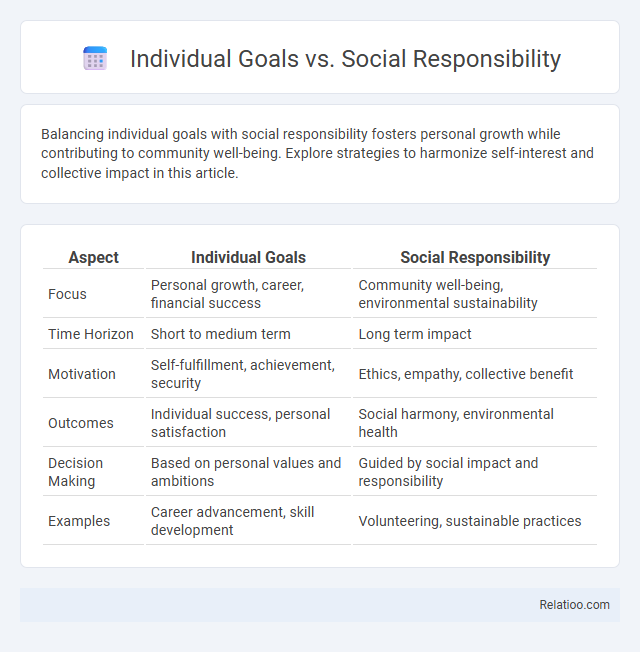Balancing individual goals with social responsibility fosters personal growth while contributing to community well-being. Explore strategies to harmonize self-interest and collective impact in this article.
Table of Comparison
| Aspect | Individual Goals | Social Responsibility |
|---|---|---|
| Focus | Personal growth, career, financial success | Community well-being, environmental sustainability |
| Time Horizon | Short to medium term | Long term impact |
| Motivation | Self-fulfillment, achievement, security | Ethics, empathy, collective benefit |
| Outcomes | Individual success, personal satisfaction | Social harmony, environmental health |
| Decision Making | Based on personal values and ambitions | Guided by social impact and responsibility |
| Examples | Career advancement, skill development | Volunteering, sustainable practices |
Defining Individual Goals and Social Responsibility
Individual goals pertain to personal ambitions and desired achievements that shape one's career, lifestyle, and personal growth priorities. Social responsibility involves the ethical framework where individuals or organizations act to benefit society at large, often encompassing environmental sustainability, community welfare, and ethical business practices. Understanding the distinction highlights how personal objectives align or diverge from the broader commitments expected by social responsibility.
The Importance of Personal Ambitions
Personal ambitions drive innovation and self-improvement, serving as the foundation for individual success and fulfillment. Balancing your goals with social responsibility ensures that personal achievements contribute positively to community welfare and ethical standards. Recognizing the difference between social obligation and genuine social responsibility helps maintain motivation while fostering meaningful societal impact.
Understanding Social Responsibility in Society
Understanding social responsibility in society involves recognizing the balance between pursuing individual goals and fulfilling social obligations that contribute to communal well-being. Social responsibility extends beyond personal ambitions by emphasizing ethical behavior and accountability toward the environment, community, and broader social systems. This concept drives individuals and organizations to act in ways that promote sustainable development, social equity, and collective progress.
Balancing Self-Interest and Collective Good
Balancing individual goals with social responsibility requires aligning personal ambitions with the welfare of the community, ensuring self-interest does not undermine collective well-being. Social obligation mandates compliance with societal norms and ethical duties, promoting actions that benefit the group even when they conflict with personal desires. Effective balance integrates self-interest with social responsibility, fostering sustainable development and harmonious coexistence within society.
Conflicts Between Individual Goals and Social Needs
Conflicts between individual goals and social needs arise when personal ambitions diverge from the collective welfare, creating tension in balancing self-interest with community expectations. Individual goals often prioritize personal success, autonomy, and achievement, while social responsibility demands actions that benefit society, sometimes requiring personal sacrifices. Social obligation enforces compliance with societal norms and duties, further complicating decisions when individual desires conflict with communal responsibilities.
Benefits of Aligning Personal Success with Social Impact
Aligning your personal success with social impact creates a meaningful synergy between individual goals, social responsibility, and social obligation, fostering sustainable growth for both you and your community. This alignment enhances reputation, builds trust, and attracts opportunities by demonstrating commitment to ethical practices and collective well-being. Embracing this integration drives innovation and long-term value, benefiting society while advancing your personal and professional aspirations.
Strategies for Integrating Social Responsibility in Personal Growth
Integrating social responsibility in personal growth involves aligning individual goals with community welfare through strategies like ethical decision-making, volunteerism, and sustainable lifestyle choices. Emphasizing social obligation, individuals can adopt practices that contribute to societal well-being while advancing their own development. Effective integration requires balancing self-improvement with proactive engagement in social causes, fostering a harmonious relationship between personal ambitions and collective impact.
Real-Life Examples: Individual vs. Collective Priorities
Balancing individual goals with social responsibility often creates tension, as seen when a business prioritizes profit over environmental sustainability, conflicting with community well-being. Your decision to volunteer at a local shelter exemplifies social responsibility, while social obligation manifests in legal requirements like paying taxes that support public services. Real-life examples highlight the challenge of aligning personal ambitions with collective priorities, emphasizing the need for ethical consideration and societal impact.
Challenges in Harmonizing Both Aspects
Balancing individual goals with social responsibility and social obligation presents challenges such as conflicting priorities and resource allocation. You may struggle to pursue personal ambitions while meeting community expectations or ethical duties, leading to stress and compromised outcomes. Achieving harmony requires strategic planning and empathy to align personal success with collective well-being.
Future Perspectives on Individual and Social Commitments
Future perspectives on individual and social commitments emphasize balancing personal goals with social responsibility and social obligation to foster sustainable community development. Your individual goals can align with broader social responsibilities by adopting ethical practices that contribute to environmental sustainability and social equity. Embracing this integrated approach ensures long-term benefits for both personal growth and collective well-being in an increasingly interconnected world.

Infographic: Individual goals vs Social responsibility
 relatioo.com
relatioo.com